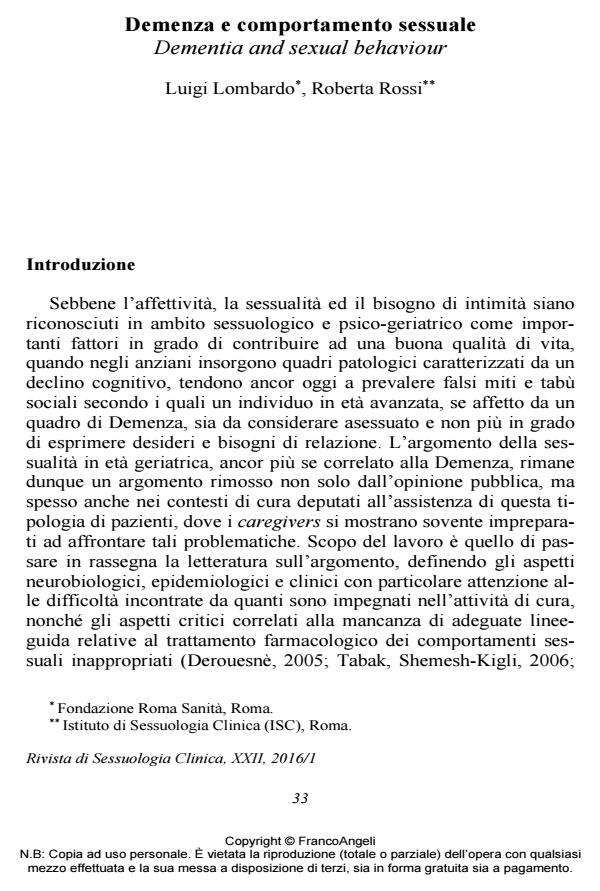Dementia and sexual behaviour
Journal title RIVISTA DI SESSUOLOGIA CLINICA
Author/s Luigi Lombardo, Roberta Rossi
Publishing Year 2016 Issue 2016/1
Language Italian Pages 18 P. 33-50 File size 276 KB
DOI 10.3280/RSC2016-001002
DOI is like a bar code for intellectual property: to have more infomation
click here
Below, you can see the article first page
If you want to buy this article in PDF format, you can do it, following the instructions to buy download credits

FrancoAngeli is member of Publishers International Linking Association, Inc (PILA), a not-for-profit association which run the CrossRef service enabling links to and from online scholarly content.
Although sexuality, love and intimacy remain important parts of life in older people and demented patients, a myth believed by society is that individuals with dementia are asexual and that sexual desires and needs for connection will wane overtime. In reality sexuality in individuals with dementia may be expressed as inappropriate sexual behaviours (ISB). There is not conformity in the literature regarding how to define this type of behaviour, however these ISB involve any verbal or physical action of a sexual nature which is displayed in an inappropriate social context. Examples of ISB include: exposure of genitals in public/ward environments, masturbation in public areas and all types of sexual assault. Expressing sexuality by demented subjects and dealing with inappropriate sexual expression are source of concerns for the nursing staff, other residents, and families. Little research has been done concerning treatment for this behavioural disorde, so the literature regarding treatment is limited. Non-pharmacologic interventions for ISB (eg. distraction, behavioural tecniques, participation in craft) might be effective when tailored to individual patients. A number of drug treatments (eg. antidepressant, antiandrogen, antipsychotic, and anticonvulsivant madications) have been proposed, however, evidence to support drug treatments is limited, adverse effects remain an important consideration, and it is unclear which should be used as firstline versus second-line treatments.
Keywords: Dementia, sexual behaviour, Alzheimer’s disease, Frontotemporal dementia, disinibition, hypersexuality, aggressive behaviour
- Social Issues Surrounding Harassment and Assault Vaitsa Giannouli, pp.625 (ISBN:9781522570363)
- Social, Psychological, and Forensic Perspectives on Sexual Abuse Vaitsa Giannouli, pp.207 (ISBN:9781522539582)
Luigi Lombardo, Roberta Rossi, Demenza e comportamento sessuale in "RIVISTA DI SESSUOLOGIA CLINICA" 1/2016, pp 33-50, DOI: 10.3280/RSC2016-001002